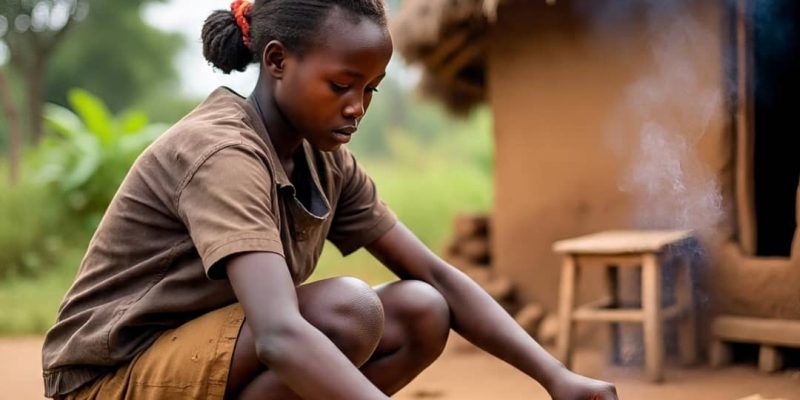By Vongai Masuka
In the quiet, villages of rural Zimbabwe, where the rhythm of life is set by the rising and setting sun, a profound and often unseen struggle unfolds.
Having lived in Harare means one may not understand or relate to the normal but sad realities that rural kids of school going age face quite often, specifically the dearest girl child.
This is not a battle waged with weapons or shouts, but a silent, relentless fight against the invisible chains of poverty, deeply rooted traditions, and the simple, undeniable realities of growing up.
At the centre of this drama lies a crisis known as ‘period poverty’, a cruel thief that steals a girl’s dignity, jeopardizes her health, and, too often, snuffs out the flickering flame of her dreams for an education and a brighter tomorrow.
Imagine a young girl, barely a teenager, her body beginning its natural journey into womanhood.
The onset of menstruation should be a normal, and to her, a very new experience. But for countless girls in rural Zimbabwe, it ushers in a heart-wrenching reality: no access to sanitary pads, at all.
At the end of the day, torn scraps of cloth, plucked leaves, sun-dried cow dung, or even handfuls of ash, emerge as the only option.
These become their grim, makeshift shields.
These desperate measures, born of sheer necessity, offer little protection. Instead, they invite debilitating infections, constant discomfort, and a profound, searing humiliation that etches itself onto their young souls.
The unbearable fear of leaks and tell-tale stains becomes a constant companion, a dark shadow that clings to them even when they dare to step into a classroom.
But the burdens on these young shoulders extend far beyond their monthly cycle.
In the traditional fabric of many rural Zimbabwean households, an unspoken law dictates that girls bear the lion’s share of domestic chores.
While their fellow brothers are often granted the luxury of immersing themselves in textbooks, girls wake before the first blush of dawn.
Their days are a relentless ballet of labor, fetching water from distant wells, sometimes miles away, the heavy buckets weighing down their slender frames, gathering firewood, a precious commodity in the sparse landscape meticulously cooking meals over smoky open fires and tirelessly cleaning the family home.
This unyielding cycle of toil leaves them bone-weary, their minds dulled by exhaustion, with precious little time or energy left for the demanding world of academics.
The disparity is a cruel twist of fate as boys often enjoy the serene luxury of focused learning, while beloved Chipo, Ruvarashe or Kundai juggles the weighty textbooks with even weightier buckets, their aspirations of an education often put on a heartbreaking hold, or worse, entirely abandoned.
It’s a testament to their spirit that many even manage to attend school at all.
The effects of this silent struggle are profound and stretch far into their futures.
Girls in rural Zimbabwe are more likely to miss school during their menstrual cycles. This isn’t just about the absence of sanitary products; it’s also about the agonizing lack of clean water and private, dignified sanitation facilities at their schools.
When they do manage to attend, the constant gnawing worry of an accidental stain, the shame of potential exposure, and the discomfort of inadequate hygiene take a severe toll on their mental well-being.
This relentless stress breeds feelings of deep embarrassment, erodes their self-esteem, and fosters a painful social isolation, making it incredibly difficult for them to concentrate on lessons or fully engage in the vibrant reality of school life.
Alarming as it is, but it is real that approximately 72% of menstruating schoolgirls in Zimbabwe are unable to afford sanitary products, and 62% of them miss school every single month as a direct consequence.
With a national student population hovering around 4.7 million, and assuming roughly half are female, this translates into millions of girls whose education is repeatedly interrupted, their potential dimmed by these systemic challenges.
This situation is further complicated by deeply ingrained societal attitudes that act like invisible fences, corralling girls into pre-defined roles.
From a tender age, girls are often taught, explicitly or implicitly, that their primary purpose in life is to marry, bear children, and manage a household.
Boys, in the contrary, are actively encouraged to pursue education, careers, and leadership roles. This deeply unequal mindset perpetuates a vicious cycle, limiting girls’ potential to bloom and entrenching poverty across generations.
Without the bedrock of an education, girls find themselves with fewer opportunities, less agency over their own lives, and limited access to financial independence. This vulnerability makes them tragically susceptible to early marriages, teenage pregnancies, and a lifetime of economic hardship.
Studies confirm that limited access to education for rural girls contributes directly to high rural unemployment, agonizing household food insecurity, and even increased maternal and infant mortality rates – a bold reminder that the ripples of period poverty extend far beyond the individual girl.
Breaking this deeply entrenched cycle, this age-old narrative, demands a comprehensive, multi-pronged approach that courageously tackles the root causes of period poverty and actively challenges these archaic gender norms. First and foremost, initiatives focused on providing affordable sanitary products are not just helpful, they are paramount.
Concepts like “Community Pad Centers,” where girls can access low-cost or even free sanitary wear, and mothers’ support groups,” which can empower women to produce and distribute reusable pads, offer truly practical and sustainable solutions. Inspirational organizations like The Grace and Nelly Project are already making tangible differences on the ground, providing reusable menstrual pads and, crucially, training women and girls in rural communities on the art of making them, thereby simultaneously creating much-needed sustainable employment opportunities.
Second, a robust investment in water and sanitation infrastructure is not merely a convenience; it’s a fundamental human right.
It is a sobering fact that many rural schools in Zimbabwe lack even the most basic facilities. Reports indicate that 70% of rural schools in Zimbabwe lack both water and soap for proper menstrual hygiene management.
Improving access to clean, potable water and constructing gender-sensitive, lockable latrines at schools will dramatically reduce the risk of debilitating infections and, most importantly, provide girls with the dignity and privacy they so desperately need during menstruation. Organizations like Stewart Foundation and Tugwi Trust, through their impactful projects, are piloting truly girl-friendly initiatives largely advocating for crucial policy changes.
Beyond the physical infrastructure, comprehensive menstrual hygiene education is absolutely crucial. This education needs to be delivered not just to girls, but, vitally, to boys as well.
It’s about dispelling outdated myths, shattering the silence, and actively breaking down the pervasive stigma that still surrounds menstruation.
Ultimately, a fundamental, seismic shift in societal attitudes towards greater equality and inclusivity is the bedrock upon which true change will be recognizing the inherent, undeniable value of girls’ education and empowering them to pursue their ambitions, irrespective of their gender, is the golden key to unlocking their full potential and forging a more just and equitable society for all.
The Zimbabwean government has, to their credit, shown some commitment through pilot projects, such as the one in Buhera, which provided much-needed cash transfers and menstrual hygiene kits to adolescent girls, and through commissioning formative research on Menstrual Hygiene Management in collaboration with UNICEF.
However, what is desperately needed are more widespread, sustainable, and consistently funded government initiatives. Policies that genuinely make sanitary products more accessible and affordable, coupled with an unwavering, ironclad commitment to building and meticulously maintaining girl-friendly school infrastructure across the entire nation, can truly pave the way for lasting, transformative change.
Despite the formidable obstacles and the deep-seated challenges, the story of rural girls in Zimbabwe is not merely one of struggle; it is, powerfully, a testament to immense resilience and an unwavering determination. Many girls, bolstered by the vital, compassionate support of dedicated community organizations and NGOs, are finding ingenious ways to overcome adversity and defy the odds.
There are truly inspiring examples of young women like Yvonne Chari, who, despite wrestling with the burden of school fees, received crucial support that enabled her to bravely pursue her education.
Her tenacity paid off, leading her to establish successful poultry and horticulture businesses, even drilling her own borehole for irrigation – a true resemblance of self-reliance.
We also have individual women who despite having many responsibilities are working on their missions to improve change the narrative of the girl child education.
Mary Mitchell Makoni and Nyasha Manzou, among others, have stood up beyond reasonable doubt and are working hard towards the betterment of the girl’s education.
However, we also have gentleman who have defied odds in this journey, Simbarashe Nyamazi and Brandon Tanyanyiwa. Their efforts are loudly visible as they always advocate for the girls hygienic menstruation.
By working together, hand in hand, governments, organizations, communities, and individuals – we can illuminate this silent crisis, amplify the voices that have been unheard, and forge a brighter, more equitable future where every girl in rural Zimbabwe can not just survive, but truly, magnificently, flourish.
The narrative of rural girls in Zimbabwe is one of profound resilience in the face of interconnected challenges.
While period poverty casts a long, dark shadow, it is merely one thread in a complex tapestry of obstacles that limit their potential and perpetuate cycles of hardship.
To truly understand their struggle and the urgent need for action, we must delve deeper into the layers of their experience.
The impact of period poverty on education goes beyond simple absenteeism. When a girl misses school due to lack of sanitary products, she doesn’t just miss a day of lessons; she misses discussions, she falls behind on assignments, and she gradually loses confidence.
The constant anxiety of potential leaks or ridicule stifles her ability to concentrate, leading to poor class participation, difficulty focusing, and constrained interactions with peers and teachers.
This can foster low self-esteem and anxiety, making school a place of dread rather than opportunity.
Studies show that 20% of rural primary school girls who menstruate do not attend school during their periods, accumulating a staggering 528 days of missed schooling over their academic lives.
Some girls, in a desperate attempt to avoid shame, even hide in the bush during school hours, only returning home when classes are over, fooling their parents into believing they attended.
This does not only robe them of education but also of trust and a sense of belonging.
Beyond the physical discomfort and educational setbacks, period poverty exacts a heavy toll on the mental health of adolescent girls.
The shame and stigma surrounding menstruation, often fueled by cultural taboos, force girls into a silent struggle. They internalize the idea that their natural bodily function is something to be hidden, something “unclean.” This can lead to feelings of embarrassment, low self-esteem, and even symptoms of depression.
Imagine the constant dread as that time of the month approaches, bringing with it the fear of being mocked, ostracized, or simply unable to participate in daily life.
Some girls experience such severe anxiety that it manifests as physical attacks.
Families in rural areas often live in extreme poverty, with limited economic opportunities.
This means that basic necessities like food take precedence, leaving no room in the budget for sanitary products.
Girls are seen primarily as future wives and mothers, their value tied to domesticity rather than intellectual pursuit or career aspirations. This mindset limits their opportunities and reinforces the cycle of poverty.
Many rural girls lack access to accurate information about sexual and reproductive health, including contraception.
This vulnerability, coupled with economic desperation, can tragically lead to increased rates of sexual abuse, early marriages, and unwanted pregnancies.
Long distances to school, sometimes up to 10 km, or even more and the demands of home life, make consistent attendance a Herculean task for many rural girls.
Despite the enormity of these challenges, hope flickers brightly in the dedicated efforts of communities, NGOs, and, increasingly, the government.
Grassroots movements are proving to be powerful agents of change.
Trust for Youth Development in Zimbabwe has been instrumental in distributing reusable sanitary pads and menstrual cups, coupled with Menstrual Health Management (MHM) education, even involving boys and men to challenge harmful gender norms and end “period shaming.”
By continuing to support community-led initiatives, advocating for strong government policies, investing in vital infrastructure, and consistently challenging traditional gender roles, we can ensure that every girl in Zimbabwe has the fundamental right to manage her menstruation with dignity, pursue an uninterrupted education, and ultimately, write her own success story.








Comments